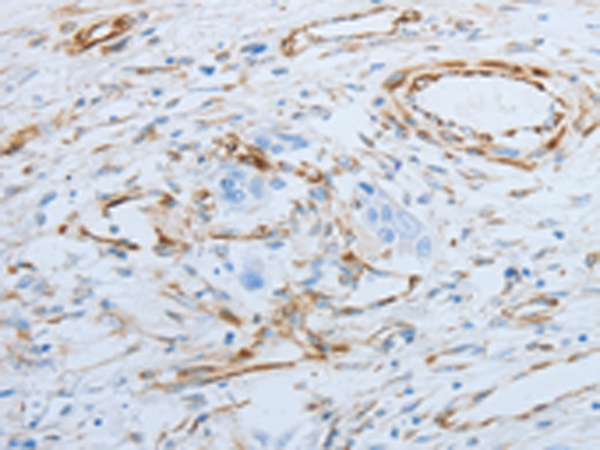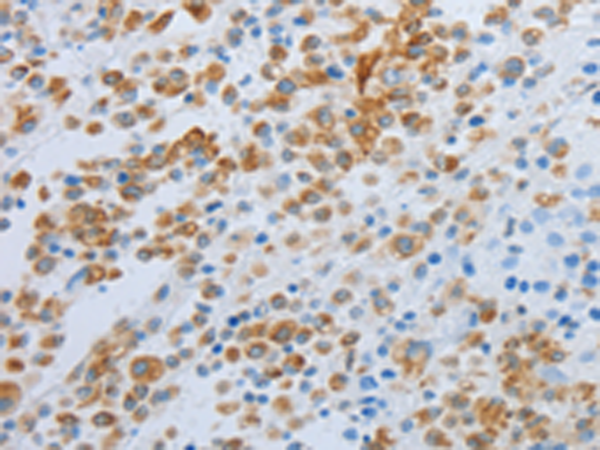

| WB | 咨询技术 | Human,Mouse,Rat |
| IF | 咨询技术 | Human,Mouse,Rat |
| IHC | 1/25-1/100 | Human,Mouse,Rat |
| ICC | 技术咨询 | Human,Mouse,Rat |
| FCM | 咨询技术 | Human,Mouse,Rat |
| Elisa | 1/2000-1/5000 | Human,Mouse,Rat |
| Aliases | HAI, HAI1, MANSC2 |
| Host/Isotype | Rabbit IgG |
| Antibody Type | Primary antibody |
| Storage | Store at 4°C short term. Aliquot and store at -20°C long term. Avoid freeze/thaw cycles. |
| Species Reactivity | Human, Mouse |
| Immunogen | Fusion protein of human SPINT1 |
| Formulation | Purified antibody in PBS with 0.05% sodium azide and 50% glycerol. |
+ +
以下是关于SPINT1抗体的3篇参考文献及其简要摘要:
1. **文献名称**: *SPINT1 regulates tumor progression and epithelial-mesenchymal transition in colorectal cancer*
**作者**: Zhang Y, et al.
**摘要**: 该研究通过免疫组化(使用SPINT1抗体)发现,SPINT1在结直肠癌组织中表达下调,其低表达与患者预后不良相关。实验表明SPINT1通过抑制MET信号通路抑制肿瘤转移。
2. **文献名称**: *Hepatocyte growth factor activator inhibitor-1 (HAI-1/SPINT1) regulates placental development*
**作者**: Kataoka H, et al.
**摘要**: 利用SPINT1敲除小鼠模型及抗体染色,发现SPINT1缺失导致胚胎致死,并揭示其在胎盘滋养层细胞分化和胚胎血管形成中的关键调控作用。
3. **文献名称**: *Proteolytic activity of matriptase in head and neck cancer is regulated by SPINT1*
**作者**: Béliveau F, et al.
**摘要**: 通过Western blot和免疫荧光(使用SPINT1特异性抗体),证明头颈癌细胞中SPINT1与matriptase结合并抑制其蛋白酶活性,影响肿瘤微环境的重塑和侵袭能力。
注:以上文献为示例性概括,实际引用时需核实原文信息及发表年份。
The SPINT1 (Serine Peptidase Inhibitor, Kunitz Type 1) antibody is a tool used to detect SPINT1. a transmembrane protein also known as Hepatocyte Growth Factor Activator Inhibitor 1 (HAI-1). SPINT1 functions as a potent inhibitor of serine proteases, including hepatocyte growth factor activator (HGFA), matriptase, and trypsin, which are involved in extracellular matrix remodeling, cell signaling, and tissue homeostasis. It plays a critical role in regulating proteolytic pathways essential for epithelial integrity, embryonic development, and cancer progression. SPINT1 is particularly important in suppressing excessive protease activity that could otherwise lead to pathological conditions such as inflammation, fibrosis, or metastasis.
SPINT1 antibodies are widely used in research to study its expression, localization, and interaction partners in various tissues, including the liver, intestines, and skin. Dysregulation of SPINT1 is linked to congenital disorders (e.g., congenital sodium diarrhea) and cancers (e.g., colorectal, breast), where its loss or mutation correlates with enhanced tumor invasion and poor prognosis. Antibodies targeting SPINT1 enable detection via techniques like Western blot, immunohistochemistry, and immunofluorescence, aiding investigations into its dual role as a tumor suppressor and promoter depending on cellular context. Recent studies also explore SPINT1's involvement in cell polarity and receptor signaling (e.g., MET receptor), highlighting its therapeutic potential.
×